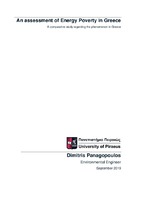An assessment of energy poverty in Greece: a comparative study regarding the phenomenon in Greece

Προβολή/
Λέξεις κλειδιά
IEA ; Energy poverty ; Electricity consumption ; GDP per capita ; Primary energy consumptionΠερίληψη
Energy poverty is a multifactorial problem that affects both developing countries as well as developed ones. In Europe, it is estimated that 1 out of 10 people is affected by energy poverty. According to the figures, 57 million people are unable to heat their homes in the winter, 104 million people do not have the ability to use air conditioners in their homes in the summer and 52 million people have arrears on their energy bills. These data, combined with the percentage of income that is exclusively dedicated in covering energy bills, makes energy poverty an actual problem within EU. In Greece, the phenomenon is more severe. Along with the huge economic recession between 2010-2018, when the GDP fell by 25% and fiscal measures were enforced during three different bailout programs, it is estimated that in Greece six out of ten households suffer from energy poverty. In the context of this diploma thesis, the phenomenon of energy poverty was studied, along with its correlation to different macroeconomic aggregators’ for the European Union, the EU-28 and Greece. Furthermore, its impact and the legislation existent for the combat against energy poverty were demonstrated while at the same time, different approaches that were studied are listed in this thesis. Given the fact that for Greece, there is not an official definition for energy poverty, these studies are important in order to assess this multidimensional phenomenon as accurately it is possible. Simultaneously, different actions against energy poverty are analyzed in the following pages, thus indicating the different approaches that are followed between countries or organizations. This Thesis proposes potential actions that could be adopted from the State as well as from companies, other organizations and furthermore, lists already existent and successful ones that are imposed by countries within EU, other companies & NGOs.


